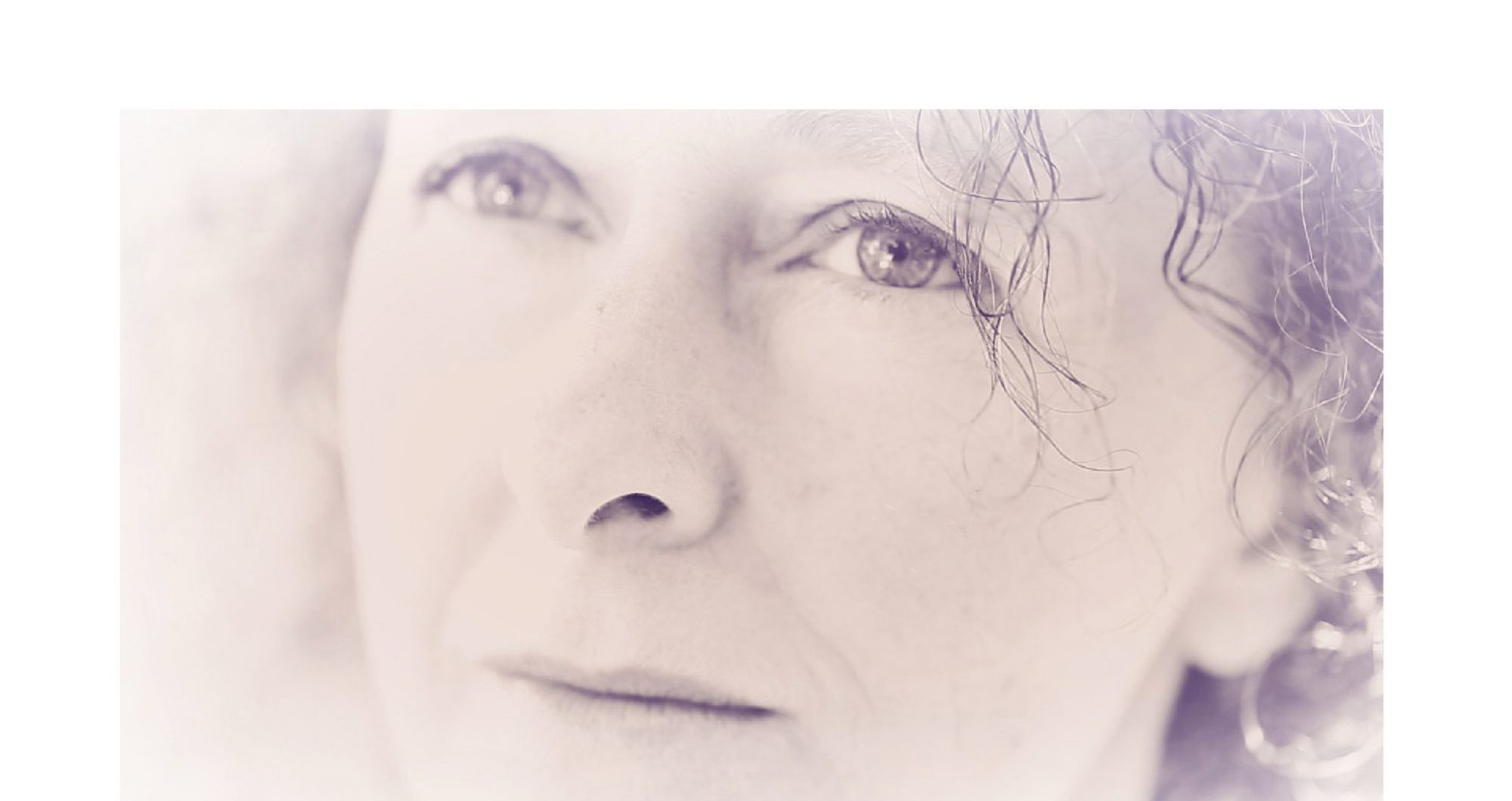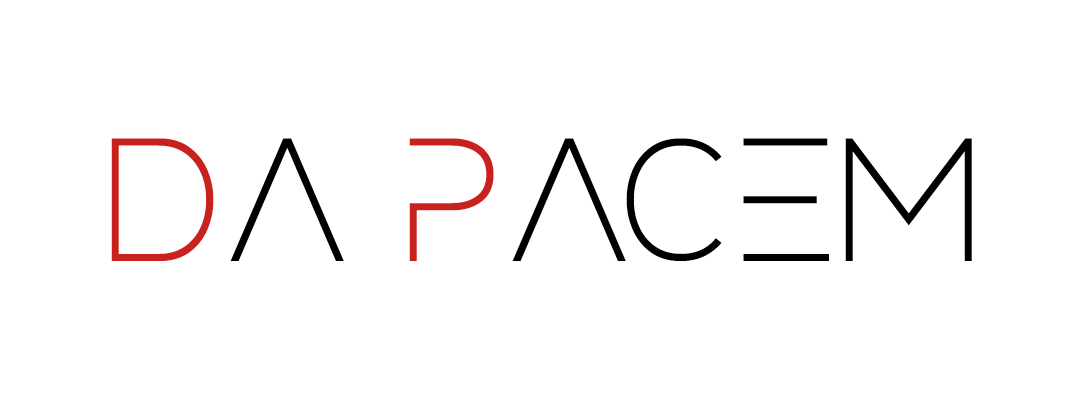
Founded by singer Raphaële Kennedy and composer Pierre-Adrien Charpy, DA PACEM company’s creative shows are always the result of a human adventure.
They embody the desire of diverse artistic personalities, both independent and recognised, to flourish in a shared project. Their affinity for certain literary, musical and visual languages shapes their multi-disciplinary creations, which they aim to be poetic and engaging.
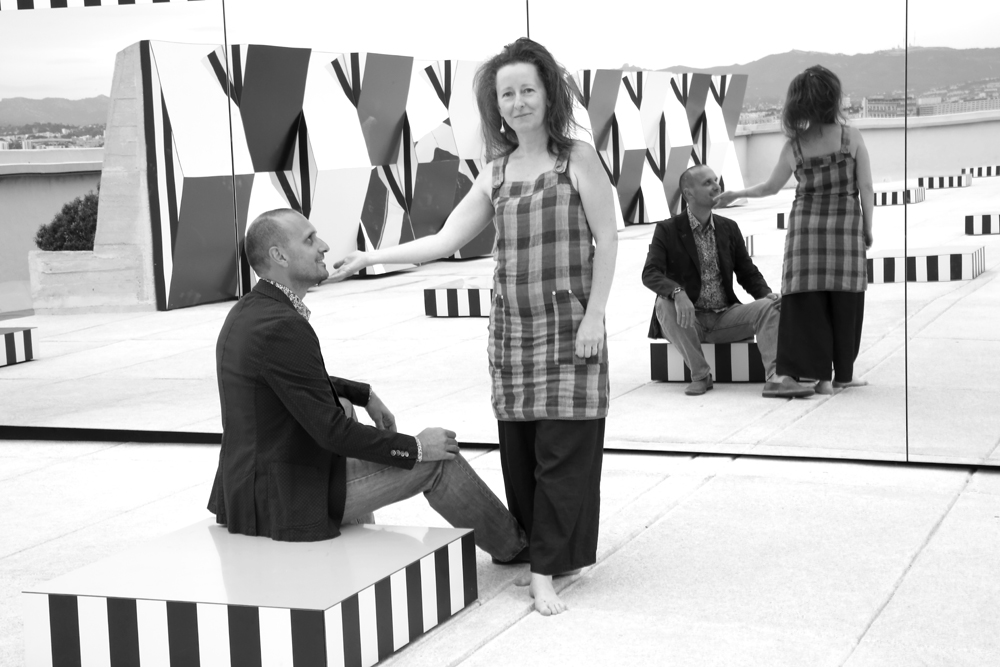

Artists
Raphaële Kennedy, Vincent Bouchot | voices
Aliisa Neige Barrière | violin
Camilla Hoitenga | flute
Serge Bertocchi | saxophone
Valérie Dulac | cello
Éric Chalan | electric double bass
Jean-Jacques Bédikian | piano
Christian Bini, Cédric Clef | percussion, drums
Pierre-Adrien Charpy | composition, electronics, keyboards
Guilhem Lacroux | composition, electronics, cithara, keyboards
Jean-Baptiste Barrière | realisation of images, electronics realisation
Alain Boeuf, Aurélien Charpy | realisation of images
LE ROI DU CIRQUE
In coproduction with Tous en sons! festival
Movie by Édouard-Émile Violet & Max Linder in film-concert
Music by Pierre-Adrien Charpy

Raphaële Kennedy | voice
Pierre-Adrien Charpy | keyboards
Éric Chalan | electric doublebass
Christian Bini | drums
Max de Pompadour is an inveterate party animal. Asked by his uncle to settle down and get married, he says he loves the beautiful Ketty, who is a triumph at the Buffalo Circus. Neither Max’s uncle nor Ketty’s father accepts what they see as a mismatch. At Ketty’s insistence, Max decides to become « king of the circus » : he dreams of becoming an acrobat, then a flea trainer, takes on an opponent in a boxing match and, believing he has faked a dressage act, turns up smiling in front of a ferocious lion. Will this be enough to win Ketty’s hand ? Long lost, this little gem of silent cinema released just over a century ago has been reconstructed and restored by Lobster Films from 11 fragments found around the world.
IL, ET SA NUIT
Poetry by Régis Lefort
Music by Pierre-Adrien Charpy
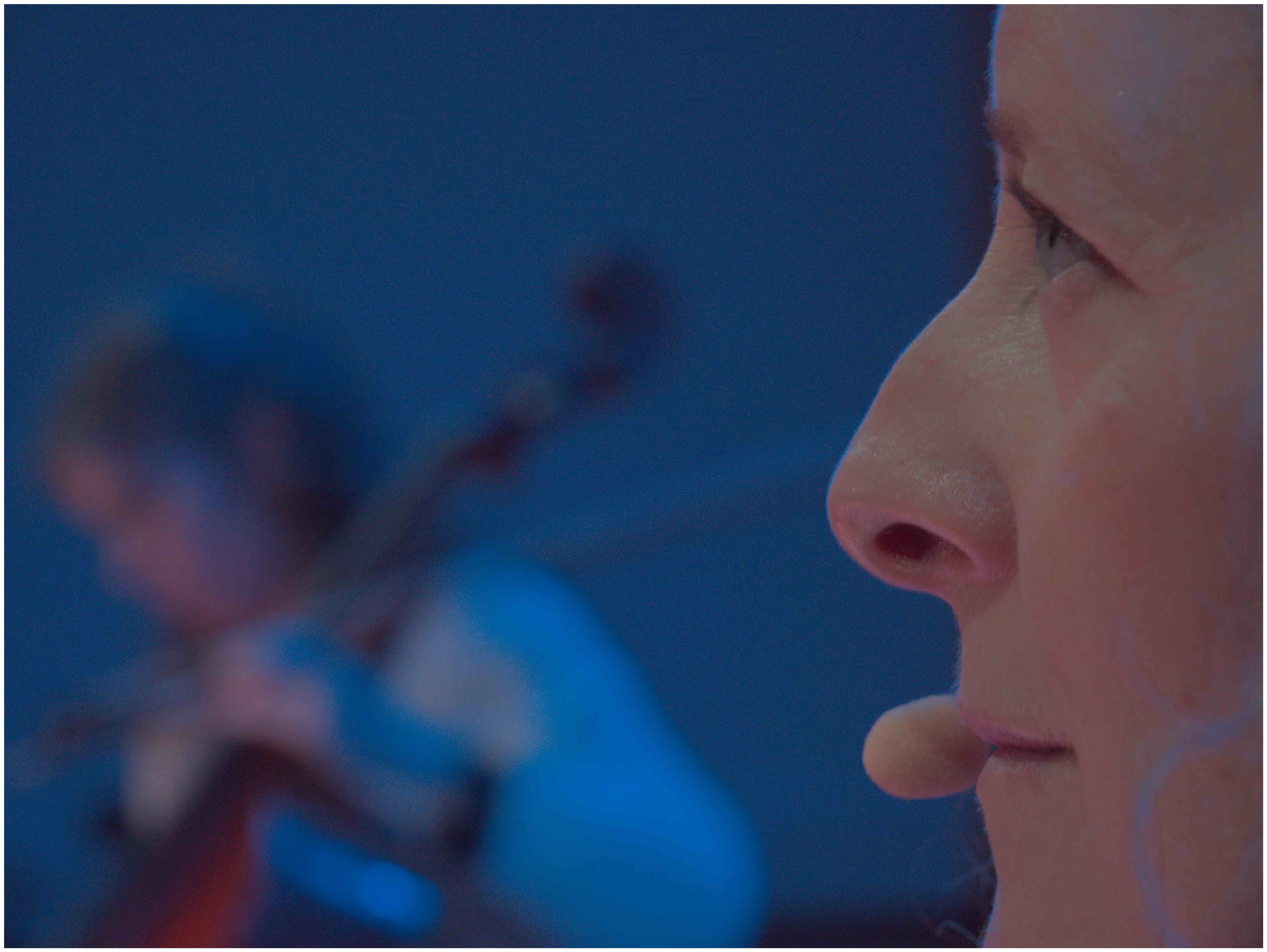
Raphaële Kennedy | voice
Valérie Dulac | cello
Pierre-Adrien Charpy | electronics
Philippe Boinon | sound
The poetic and musical show Il, et sa nuit is the result of a cross-writing, creative back and forth between the poet Régis Lefort and the composer Pierre-Adrien Charpy. At the end, we do not know what art has created the other, like the water and the sand on the beach in this tidal zone, this place called «foreshore» which is alternately covered by the sea or discovers the ground to the sky. Throughout the show, in twenty-two fragments, the music is the night of the poem, its unconscious, a sound writing from which, each time, a textual dawn emerges. Raphaële Kennedy’s voice joins Valérie Dulac’s cello to give body to this creation in the environment of multiple textures of musical electronics.
La nuit vient dans les yeux
La nuit de quelqu’un d’autre,
Sa parole qui accompagne.
James Sacré[…] The first success is the choice not to set the prose poems – taken from Il, et sa nuit and Elle suivait le vent – to music in their entirety, but to capture fragments of them like the material of a dream, the energy of a journey, the freedom of an unconscious. The twenty-two numbers alternate like so many preludes with the reading recorded by the writer, and the music and poetry gain in power of evocation: the sound universe is sumptuous, the rarefied words sometimes reach the fulgurance. […] A writing where the lines always remain legible, a patient work on the textures: those of the voice, opalescent medium, octave jumps towards the crystal with what it is necessary of quarter tones to better hear the strangeness; those of the cello, undoubtedly the most expressly virtuoso place of the composition, which multiplies the modes of play and the saturations as in a space of matter pierced by the light of the soprano. Raphaële Kennedy, obviously familiar with the music of her husband, is a soloist who travels with the same ease from the Renaissance madrigal to today’s creations. Within the Da Pacem ensemble, she shares a complicity of taste and know-how with Valérie Dulac, here a cellist, but who is just as much a player of the fiddle or the rebec. […] It, and its night, whether on the edge of silence or in its moments of great intensity, is a music that makes room for us: it welcomes us, receives us, opens us. […]
ConcertClassic, Didier Lamare, 2021
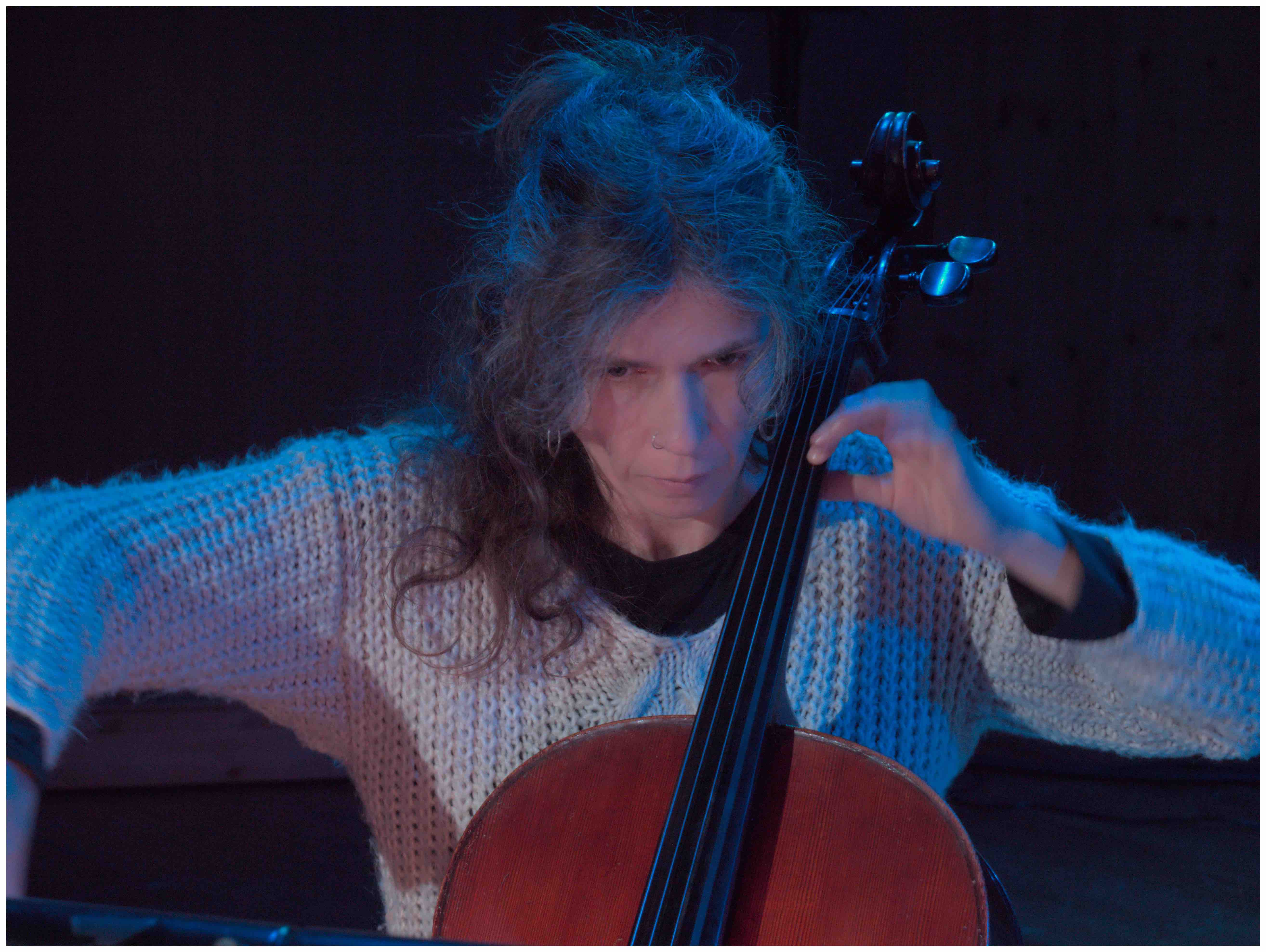
EKSTASIS
In coproduction with Jean-Baptiste Barrière / Image Auditive
Music by Kaija Saariaho, Jean-Baptiste Barrière
Visual conception and realisation by Jean-Baptiste Barrière
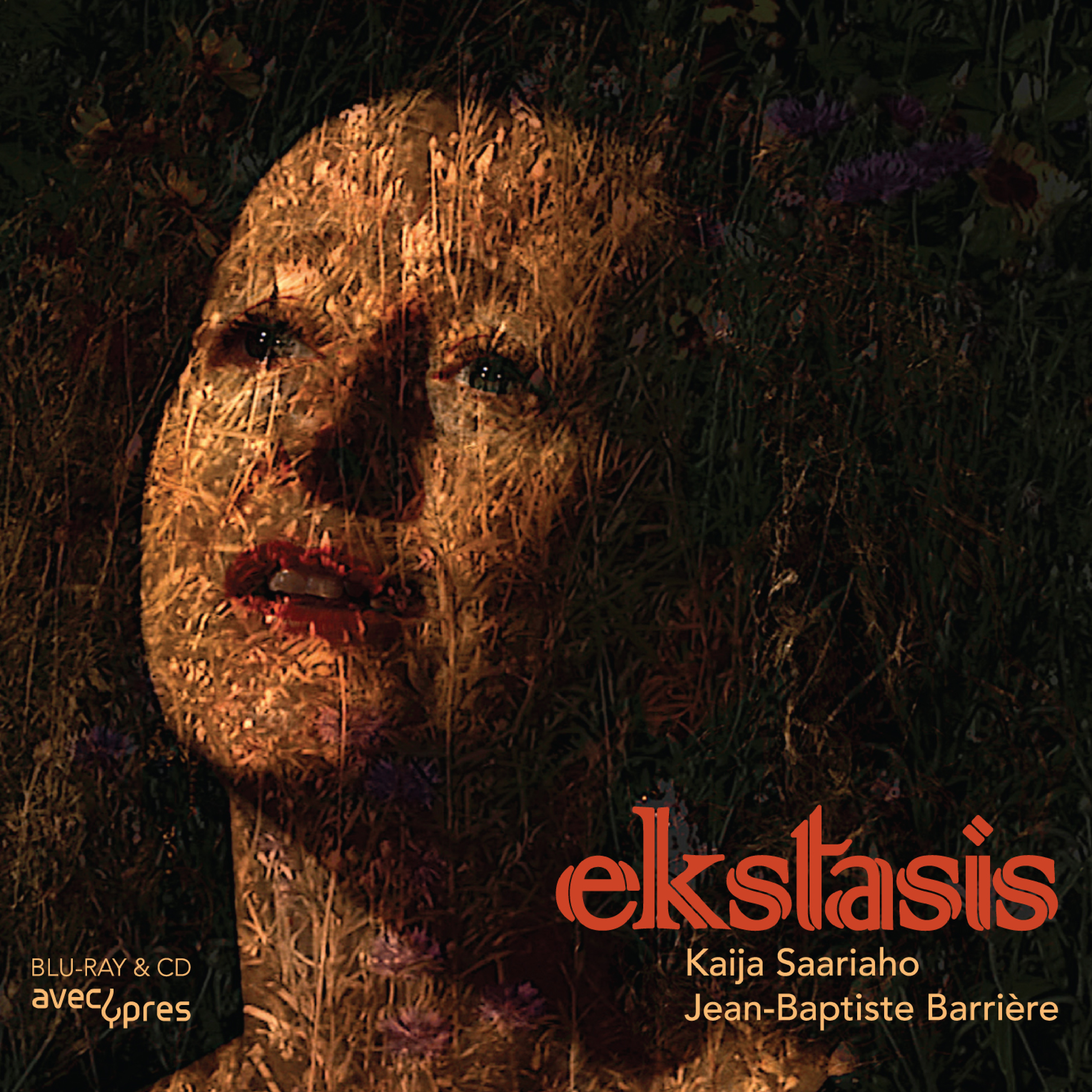
Aliisa Neige Barrière | violon
Camilla Hoitenga | flutes
Raphaële Kennedy | voice
Jean-Baptiste Barrière | design and realisation of the images, electronics realisation
Pierre-Jean Bouyer, François Galard | video processing
Isabelle Barrière | cameras and video control
Thomas Goepfer | electronics realisation
Sensory correspondences, displacement of the imagination, reversal of perspectives: it is to a similar experience that ekstasis invites you, built by sound and image around six works by Kaija Saariaho and Jean-Baptiste Barrière. The complementarity of their creative paths, living together and often working in the same way, draws the quite precise organization of the work presented. Prima la musica, dopo la visione… The three works of Kaija Saariaho are musical compositions, sound constructions, acoustic and electronic, pre-existing the vision of her husband. The three pieces by Jean-Baptiste Barrière were conceived as multimedia works, and first of all for the visual concert, with lines and rhythms that are perhaps more direct, leaving open spaces to receive the images.
Didier Lamare
This concert/show, with its visual dimension which is closely linked to the continuity of my writing, proposes […] a path, a crossing of my work, and testifies in an original way to my musical career.
Kaija SaariahoAbove all, the image must not prevent from listening to the music […]. It should not be placed on the music, or on the contrary illustrate the music. Neither should it proceed from the commentary on or around the music. It must thus be realized through its own writing, formally articulated with the musical writing, proceeding from the same ideas or techniques of composition, but developed in another sensitive dimension, without pleonasm nor arbitrary antagonism, in dynamic and evolutionary interaction. […] In this program, the music unfolds in the image, one becomes the extension of the other.
Jean-Baptiste Barrière
A sensory journey that accompanies a music that is just as much.
Le soir, Gaëlle Moury, 2019[…] The three works by each composer have the same propensity for intimate confidence. Saariaho’s works (written in the 1990s) show an exceptional quality of deployment. Nocturne’s spidery weave, NoaNoa’s spatialized amplification and Lonh’s enchanting revolutions. More recent (2003-2014), those of Barrière (the twirling Crossing the Blind Forest, the bewitching Violance and the penetrating Ekstasis) reveal a taste for the projection of the vocal or instrumental gesture which, […] ensures that the musician doubles as an authentic stage director.
Le Monde, Pierre Gervasoni, 2019Three musicians are united here: the flutist Camilla Hoitenga, faithful to the mazes of the two composers; the violinist Aliisa Neige Barrière, their daughter, whose physical and musical presence diffuses a venomous enchantment; the soprano Raphaële Kennedy, in an embodiment with a silver tip that imposes, in our opinion, the reference versions of the two vocal pieces.
L. L., 2019It was fascinating to hear what a well-balanced whole the two composers’ respective works produced. […] the two composers share many features in common, in particular their ability to structure multiple narrative layers at once and their simultaneous perception of past, present and future. At the heart of this is their unflinching belief in the relevance of modern art and its expressive powers. […] The soprano Raphaële Kennedy had perfectly internalised the worlds of Saariaho’s Lonh and Barrière’s Ekstasis.
Aamulehti, Harri Hautala, 2021Ekstasis was also an opportunity to showcase some of Saariaho and Barrière’s most trusted musicians, people who know exactly what performing these works requires. […] Camilla Hoitenga, Aliisa Neige Barrière and Raphaële Kennedy all performed their respective roles with great conviction […].
Helsingin Sanomat, Samuli Tiikkaja, 2021Ekstasis is a fascinating fusion of concert and multimedia performance […]. Raphaële Kennedy’s free, flexible and highly expressive voice was given the final word in the concert in Barrière’s Ekstasis for soprano and electronics.
Hufvudstadsbladet, Heidi Korhonen-Björkman, 2021Soprano Raphaële Kennedy gave an outstanding rendition of the vocal element of the piece, which includes much pure singing but also a wealth of extended vocal techniques. Accompanied only by electronics, Kennedy managed to retain her sense of pitch while sailing magnificently through the enormous vocal challenges Lonh presents.
Opera News, Argo McKinnon, 2012[…] Lonh, a solo soprano work given a virtuosic reading by Raphaële Kennedy […]
The New-York Times, Allan Kozinn, 2012Raphaële Kennedy was the riveting soloist in the newest work on the program, Ekstasis.
The New-York Times, Zachary Woolfe, 2014
L’ÎLE PARADIS QU’ON NE DOIT PAS DIRE
Texts by Henry Bauchau
Music by Pierre-Adrien Charpy
Video by Isabelle Françaix
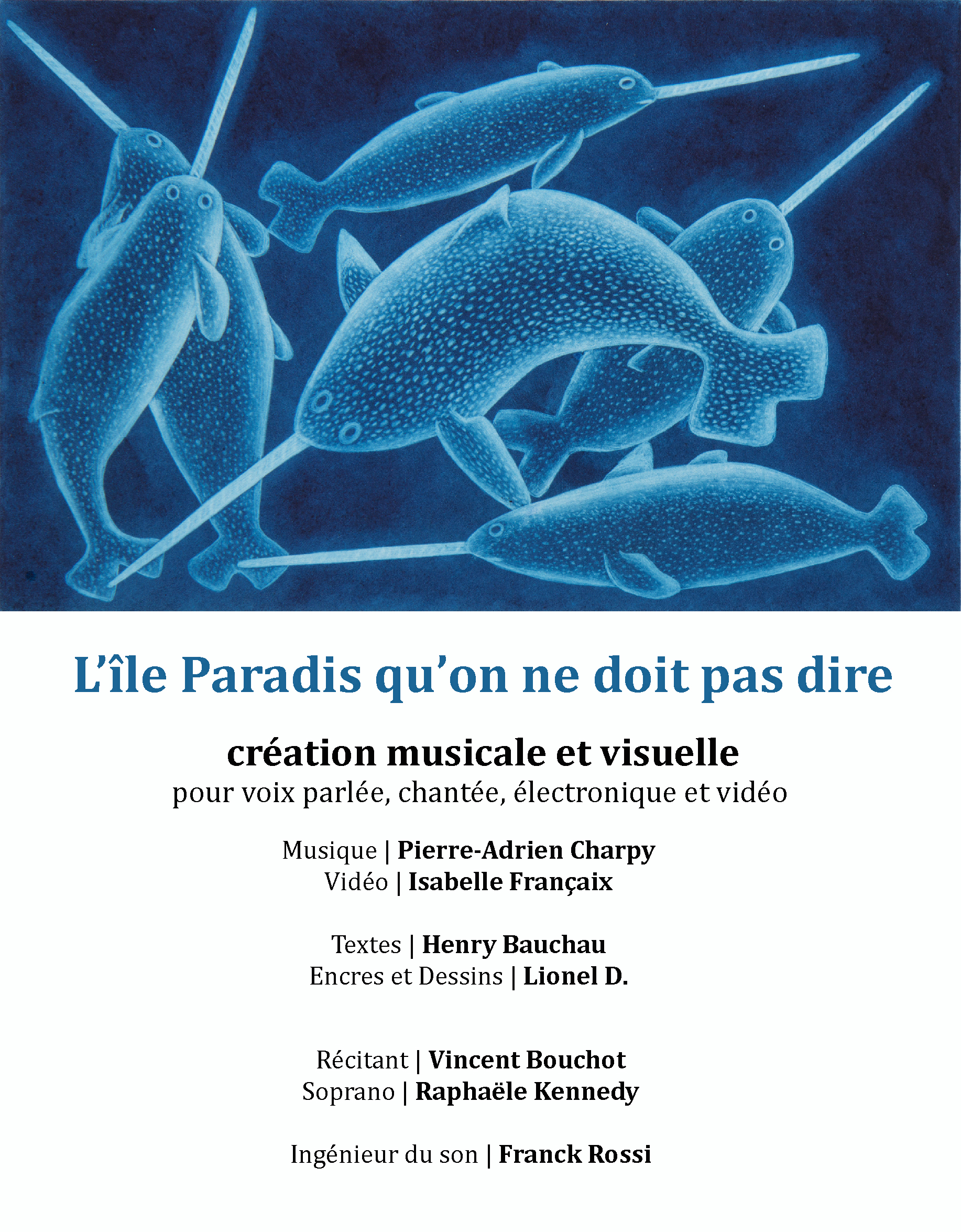
The writer Henry Bauchau (1913-2012) writes to himself and addresses his intimate reflections to his readers. From his letters and diaries written during the gestation and writing of the novel L’enfant bleu (Actes Sud, 2004) conceived on a true story, this show freely explores the correspondences between what we don’t know, live, dream or create when the daily life is torn apart. In the mysterious echo of images and sounds, the young psychotic Orion draws the labyrinths that will guide him towards creation in the day hospital with his « psychotherapist ».
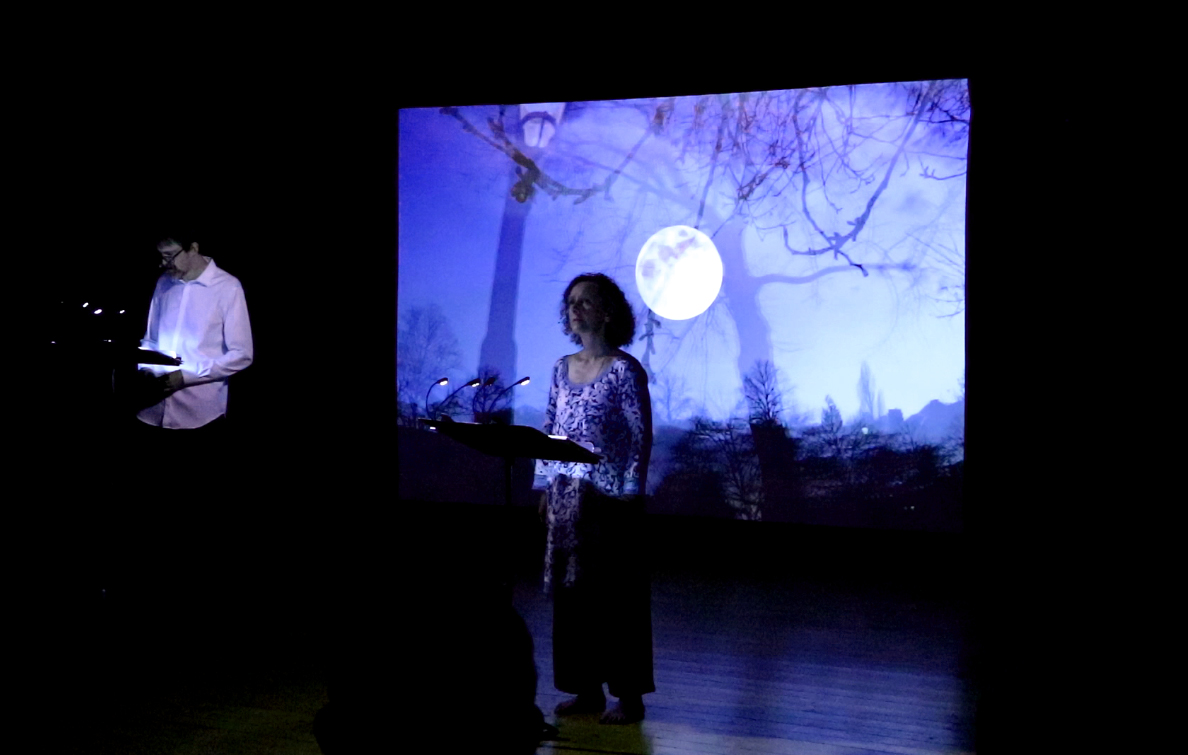
L’enfant bleu is indeed a text made to be read and perhaps one day put to music.
Henry Bauchau, Passage de la Bonne-Graine, 1999
Thank you for giving me – us – this unique moment. I am sure that Henry [Bauchau] was with you, with us, and that he would certainly have liked your Blue Child very much. […] One does not emerge unscathed from L’île Paradis that one should not say. […] To all, we were with you, with the other, with the living, with what in us, exceeds us and understands us. We were in the « body hymn », the one that animates us and carries us towards hope. […] We were lifted up. We descended in love and we experienced the most buried « in the island and the treasure ». We were faced with the abruptness of a nameless evidence.
Régis Lefort, writer and poet, specialist of Henry Bauchau, 2018[A] very high level show, very very strong, and very respectful and fair to the work of Henry Bauchau.
Thierry-Pierre Clément, poet, 2019The show […] puts in shape, at the price of a meticulous work, a labyrinth of sounds and images, colors and words, voices and songs… where each one can get lost according to his imagination. The music […] of Pierre-Adrien Charpy develops a rich sound world […]. It is omnipresent, but leaves a necessary place to the speech, to the mosaic narrative of the spoken and/or sung voices of Raphaële Kennedy and Vincent Bouchot. Their duet moves beyond the subject, by their powerful and accomplice presence, amplified by the phantasmagorical « setting in sound » of the ingenious engineer Franck Rossi. The show of « total art » is also worth by the poetry of the video creation of Isabelle Françaix and its moving images […].
Zibeline, Jacques Freschel, 2018
LE DOUX PARFUM DES TEMPS À VENIR
Text by Lyonel Trouillot
Music by Pierre-Adrien Charpy
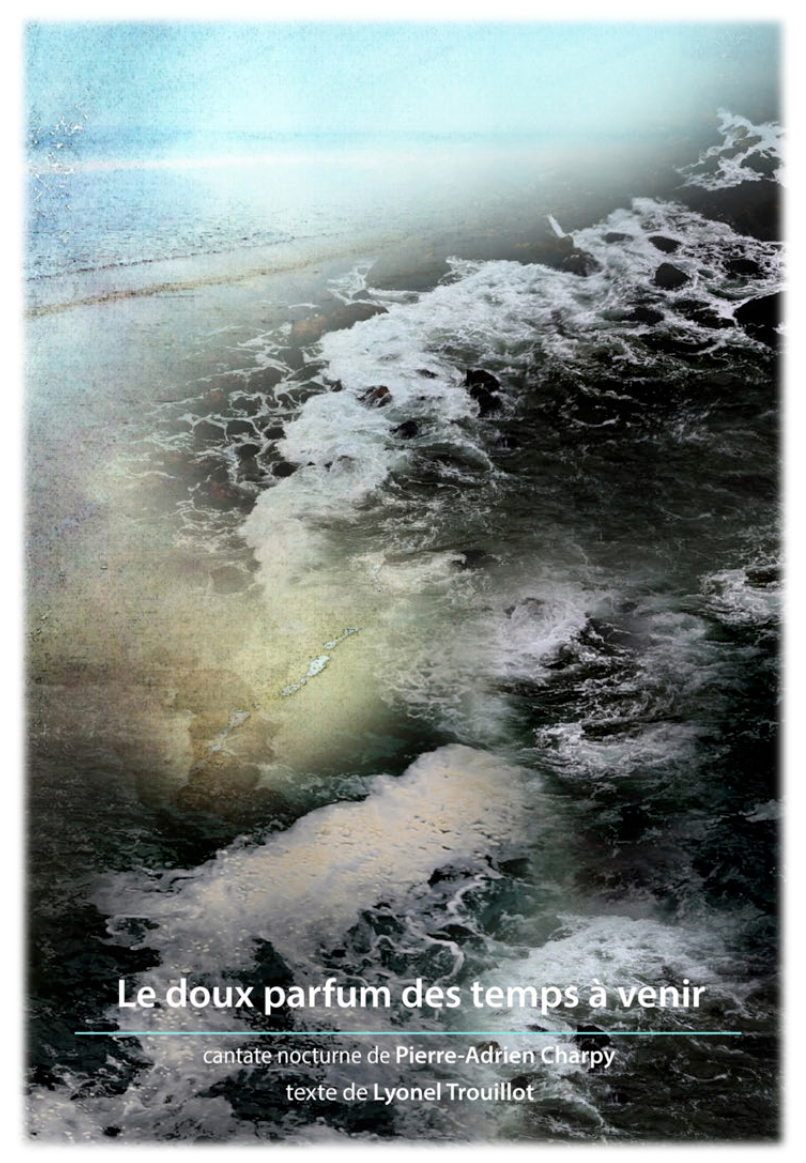
Raphaële Kennedy | voice
Camilla Hoitenga | flute
Serge Bertocchi | saxophone
Valérie Dulac | cello
Jean-Jacques Bédikian | piano
Le doux parfum des temps à venir explores the meanders of memory and imagination through the confidences of a mother – in the evening of her life – to her daughter. This story in the feminine written by a man questions the multiple faces of truth, as elusive and rich as a perfume. It is this transmission of a tireless quest for oneself among the strange bifurcations of a life that the show stages through the meeting of sounds and words, like so many reflections of a fleeting reality.
Composed from the magnificent poem of the Haitian author Lyonel Trouillot, Le doux parfum des temps à venir is a kind of unstaged opera, or nocturnal cantata written for a soprano voice and its own spoken voice in mirror […]. Two main musical gestures structure the composition: various specific instrumental techniques (multiphonics, saturations, prepared instruments…) evoke perfume through sound textures, and various polyrhythmic motifs evoke traditional Caribbean music. The third characteristic of the piece is the particular attention given to the writing of the vocal part. Several themes run through the text: mother/daughter relationship, death, transmission, truth, violence… but it is the violence against women and the capacity for resilience that stand out most intensely.
Pierre-Adrien Charpy
Your music is harsh, violent and sensual. It is not easy nor comfortable to put violence, lies and shame into music. For a long time the « I lied to you » said so superbly by Raphaële will resound. […] This work is essential because it evokes the founding act that brings children into the world. Your music says all this well and in this tension and the present danger that you knew so well how to create, that it is sweet to have these appeasements and this hope of the moments to come. […] Thank you to the artists, writers and musicians who make the voices of the little ones, the suffering, the abused by life, be heard and give them their rightful place without misery or charity, doing justice to their beauty.
Cécile Santarelli, 2019There is something in Raphaële Kennedy’s voice that sweeps you off your feet and puts you down at the same time. Something cavernous or ancestral. Something that carries the sound to its highest abode. I mean that the sensation experienced by the body […] is that of being carried away or abducted.
Régis Lefort, poet, 2019
PÉLAGOS
In coproduction with Anthropie Productions
Docu-fiction by Aurélien Charpy
Music by Pierre-Adrien Charpy
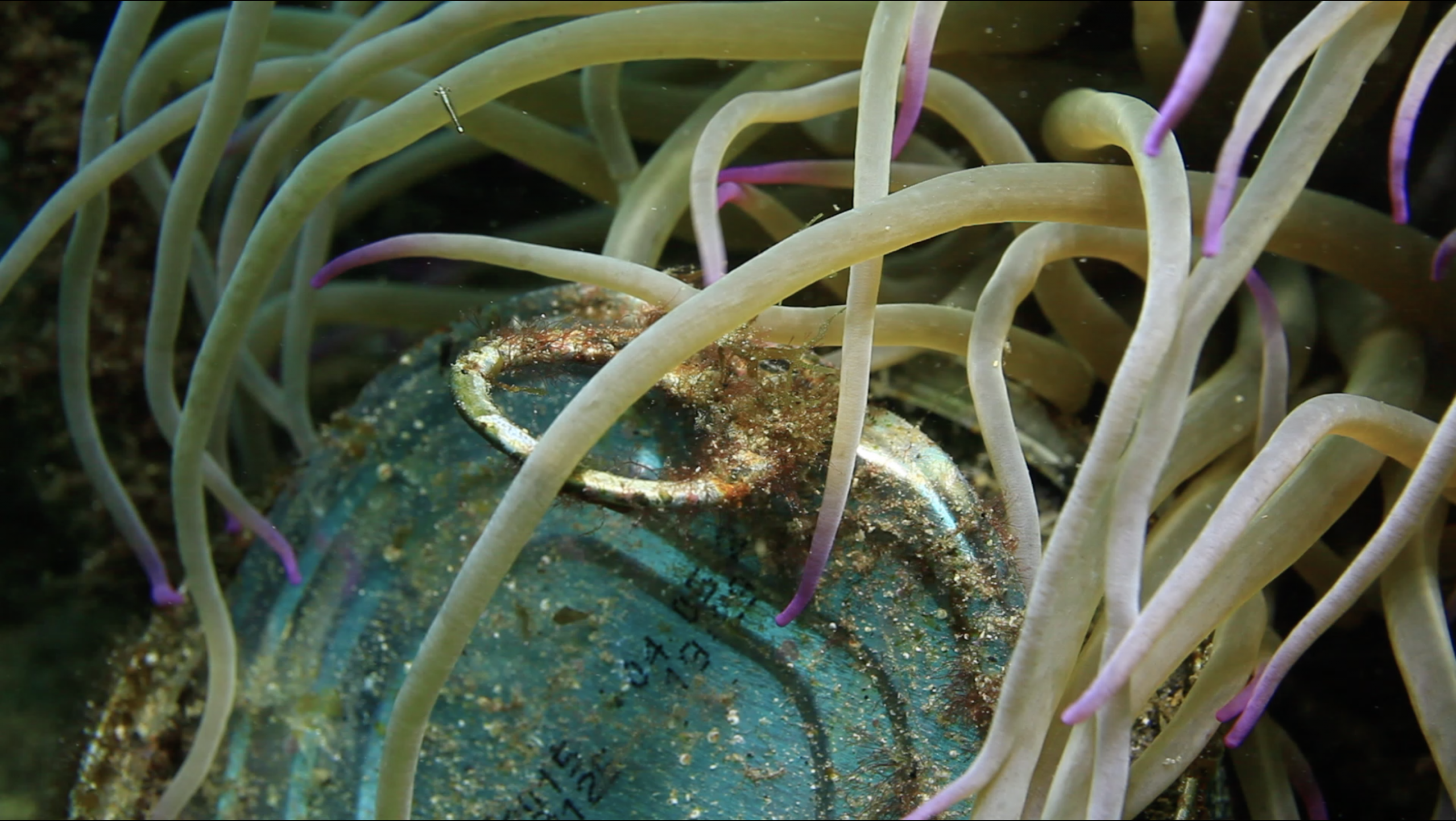
Christian Bini & Cédric Clef | percussion
Pierre-Adrien Charpy | electronics
The ciné-concert Pélagos was born of the desire to combine the creation of two works, music and film, with the issue of marine ecology and more particularly the overproduction of waste by our modern societies. From the Greek Πέλαγος, the open sea, its name evokes the immensity of the oceans and raises the question of its extreme fragility in the face of the onslaught of pollution. The « open sea » has thus become a sea « full of waste » which must lead us to change our behaviour. The musical part of the piece uses an original instrumentarium made up of recycled waste (polystyrene, bottles, cans, metal parts, pvc, etc.) and an electroacoustic device to complement it. The cinematographic part of the film, produced in the form of a docu-fiction, combines archive footage (with images supplied by the CNRS) and filming in situ, taking the viewer on a dreamlike journey where the real collides with the imaginary. Pélagos aims to raise awareness and is part of an eco-citizen approach to educating people about consumption, waste and recycling.
Photos credits:
Raphaële Kennedy & Pierre-Adrien Charpy©Isabelle Françaix
Le roi du cirque©Lobster Films
Il, et sa nuit©Alain Boeuf
Ekstasis©Jean-Baptiste Barrière
Les narvals©Lionel D.
L’île Paradis qu’on ne doit pas dire©Isabelle Françaix
Le doux parfum des temps à venir©Isabelle Françaix
Pélagos©Sandrine Ruitton
